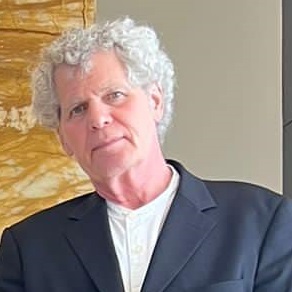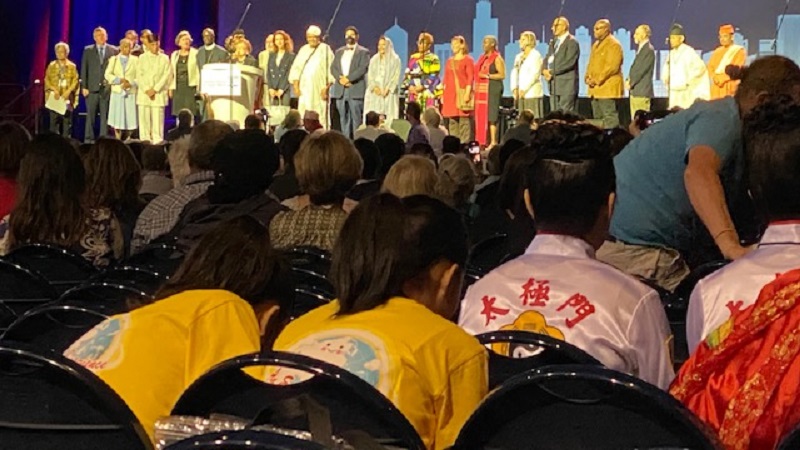Getting Religion in Chicago
A visit to the Parliament of the World’s Religions in Chicago, 30 years later
Thirty years ago, I attended my first Parliament of the World’s Religions in Chicago, which changed my life.
Last week I returned to Chicago, the birthplace of the modern interfaith movement, to attend my second parliament, accompanied by 7,000 participants from 95 countries and practitioners of more than 200 religions worldwide. Unlike my first 1983 visit, I wasn’t looking for spiritual illumination. However, I thought it might do my soul some good to check in on what is billed as “the most important and largest gathering of religious leaders and practitioners, uniting in a collective, courageous, and clear reply to the most dangerous crisis confronting us today—authoritarianism.”
My first parliament in Chicago was the centennial event of September 1993. I was making my first documentary film, Brother Minister: The Assassination of Malcolm X, and intended to use the parliament to interview Nation of Islam leader Louis Farrakhan about his relationship with Malcolm X. That interview never happened—which is another story altogether.
However, my life and career as a journalist and filmmaker radically changed when a very tall Arab Muslim dressed in Bedouin tribal garb handed me a rolled-up parchment. “Do you know the last sermon of Prophet Muhammad; peace be upon him? As-salaam alaikum.”
The final words of Prophet Muhammad affected me so much that I placed a passage from the last sermon onscreen in Brother Minister. Eight years later, these words also became my reason and justification for going to Israel in 2003 and making my documentary Blues by the Beach, and in 2017, returning to Jerusalem to make my third film, The Last Sermon. When I was blown up in a terrorist attack while filming Blues, the first words I spoke from my hospital bed were those of the prophet.
Last week in Chicago, I had dinner with Chaz Ebert, wife of the late Pulitzer Prize-winning movie critic Roger Ebert. Roger was close friends with my father for 40 years and had nicknamed my dad Billy “Silver Dollar” Baxter. Roger wrote several columns about my father’s outrageous exploits at the Cannes Film Festivals, including a chapter about Dad in Ebert’s acclaimed 2011 memoir, Life Itself.
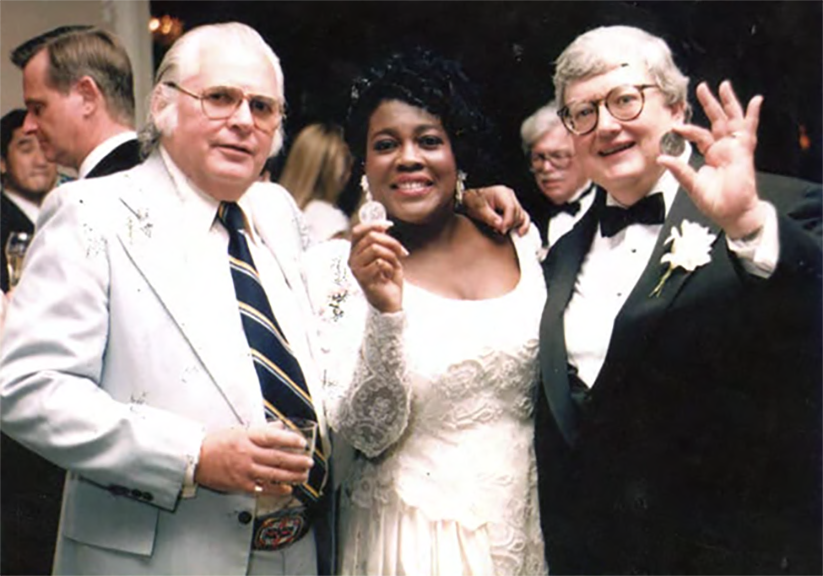
(L-R) Billy Baxter and Chaz and Roger Ebert. (Courtesy Jack Baxter)
I told Chaz I met Roger at the 1980 Cannes Film Festival, where we discussed religion. “I always thought,” I said to Chaz, “that Roger was an atheist.”
“No,” she explained, “Roger may have been agnostic, but he was certainly not an atheist. The day before he passed, he wrote me a note: ‘This is all an illusion. An elaborate hoax.’ I asked him, ‘What’s a hoax?’ He was referring to this world. Roger wrote that it is an illusion. He wasn’t visiting heaven, not in the way we may think of heaven. What he described to me was a vastness that we can’t even imagine. A place where past, present, and future are happening all at once.”
This year’s parliament featured appearances by many luminaries, including UN Secretary-General António Guterres, anthropologist Dr. Jane Goodall, and US 2024 presidential candidate Marianne Williamson, whose rousing speech brought the audience to its feet, cheering.
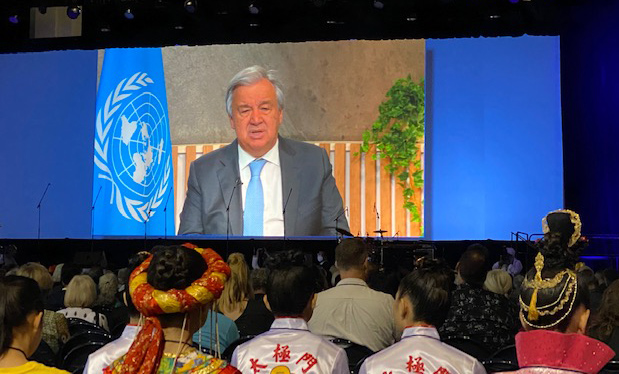
UN Secretary-General António Guterres addresses the Parliament of the World’s Religions, August 2023. (Courtesy Jack Baxter)
As I did 30 years before, I wandered through the rows of booths and tables where the religions provided literature publicizing their faith.
I met Rabbi Sam Feinsmith—where else?—by the kosher deli cart. He is the program director of the Institute for Jewish Spirituality in New York City and purchased a day pass to attend the parliament. Sam grew up in Israel from the age of 5 to 14. “I have an idea for the redemption and healing of our world: the Sabbath. If one day out of seven, everyone stopped and halted the gears of industry to rest and enjoy time with their families in prayer and meditation, I think a profound impact will happen when we then reengage with technology. It would have a greater effect on all humanity working together!”
Marissé, a 40-year International Raëlian Movement (IRM) member, handed me a brochure. “Our church does not believe in God,” she said. “For us, scientists from another planet with advanced technology created all life on Earth. They started with simple organisms and worked their way up. What we call evolution. Evolution not by chance but by design.”
The theme of our work, through the arts, and public education, is the promotion of an Islamic theology rooted in human rights, social justice, and universal human rights. We promote the inclusivity of all humankind.
At the Muslims for Progressive Values table, founder and president Ani Zonneveld told me the Prophet Muhammad’s last sermon was integral to her outreach. “The theme of our work, through the arts, and public education, is the promotion of an Islamic theology rooted in human rights, social justice, and universal human rights. We promote the inclusivity of all humankind.” May they be successful.

Ani Zonneveld, founder and president of Muslims for Progressive Values. (Courtesy Jack Baxter)
At Wednesday’s general assembly, I heard the same powerful passage from the Prophet Muhammad’s last sermon that had impacted my life. It was recited onstage by Palestinian Islamic scholar Mustafa Abu Sway: “There is no superiority of an Arab over a non-Arab or of a non-Arab over an Arab, or of a white over a black or of a black over a white except by righteousness and piety.” These words are imprinted on my heart.
Before I left Chicago for New York, I interviewed Abu Sway. I told him about my experience at the 1993 parliament and being seriously wounded in that suicide bombing 20 years ago while making Blues by the Beach. “The two terrorists were not Palestinians. They were British Muslims connected to al-Qaida and supported by Hamas. In the hospital, when I awoke from my coma three days later, the press asked for my statement. I quoted the same passage you quoted from the last sermon of Prophet Muhammad at the parliament.”
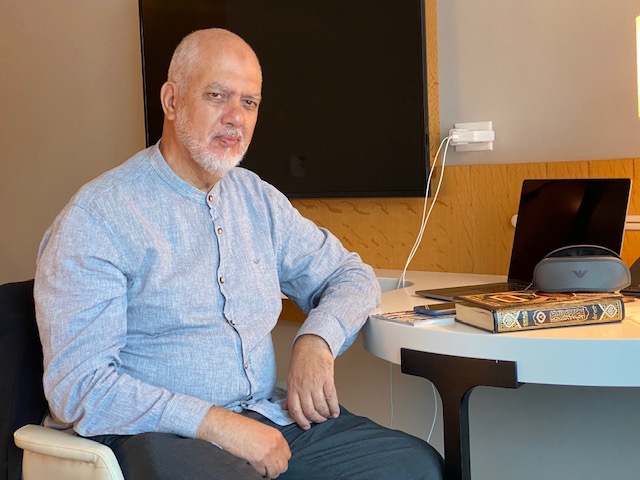
Palestinian Islamic scholar Mustafa Abu Sway. (Courtesy Jack Baxter)
Abu Sway said: “The message is monotheism, in its purest form, worshipping the one God. This is the same God of Abraham, the same God of Moses, the same God of Jesus Christ, the same God of Adam, and the same God of Prophet Muhammad, peace be upon him.”
“Do you have hope there can be a reconciliation between Palestinians and Israelis?” I asked. “Or is this just a continuing situation that goes on forever and ever?”
Abu Sway responded, “I’m very hopeful. But I’m also realistic. Right now, you can see how things are very bad, even among the Israelis, themselves. You see where this government is going, and it’s not going in a good direction for us. It has already been bad. The Israeli High Court approved the building of the Museum of Tolerance in Jerusalem on top of a Muslim cemetery. The builders exhumed 400 boxes, and 400 graves, taking the remains somewhere where they reburied them. Where they are now, I do not know.”
I pointed out that in the 1929 Hebron massacre, Jewish graves and synagogues were destroyed and used as toilets, and their cemetery became farmland. I told him I was trying to have a screening of The Last Sermon at the Museum of Tolerance in 2024.
“Go ask an Orthodox rabbi whether he will enter a museum built over a cemetery,” Abu Sway said.
Of course, the blessed are the peacemakers. But would you imagine peace by hugging or peace by addressing the injustices? Is it about a love story? Or is it about our human rights that have been lost? You cannot jump over truth and justice and simply say let’s have peace.
I changed the tenor of my questions. “Jesus said, ‘Blessed are the peacemakers.’ Does your religion say that?”
“Of course, the blessed are the peacemakers. But would you imagine peace by hugging or peace by addressing the injustices? Is it about a love story? Or is it about our human rights that have been lost? You cannot jump over truth and justice and simply say let’s have peace.”
“What do you, what do Palestinians really want? For all the Israelis to leave the West Bank? I’ve been to the settlements. I’ve been to Ma’ale Adumim and Ariel. Including East Jerusalem, around 700,000 people are living there. How do you propose getting them all to leave?”
Abu Sway looked at me deadpan. “It took six days to occupy the West Bank, Jerusalem, and Gaza Strip. Let them take six days to leave. If they start on Sunday, they’ll finish on time for the Sabbath.”
“My final question: Do you have Israeli friends? Jewish friends over there?”
“You’d be surprised how hospitable our family is. In fact, my wife is tired of the many guests that keep coming in and out. It’s an open house. But if one keeps to oneself—no friends, no Christians, no Jews, no Buddhists—does that make one a bad person? Or is that simply a personal choice?”
Although he did not exactly answer my question, I decided to end the interview. “Mustafa, thank you for your time, I’ve got to catch a plane.”
“I hope to host you on your next trip to Jerusalem, Jack,” he said. “You are my guest.”
Can the world’s religions answer and heal the profound problems plaguing humankind? I hope so, but God only knows…

